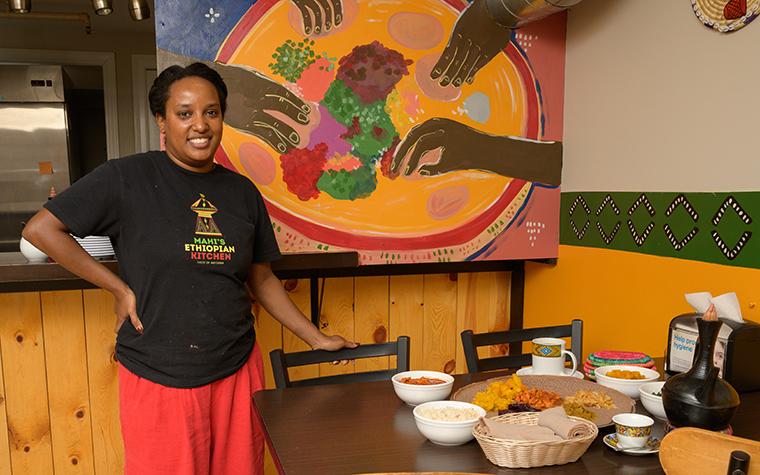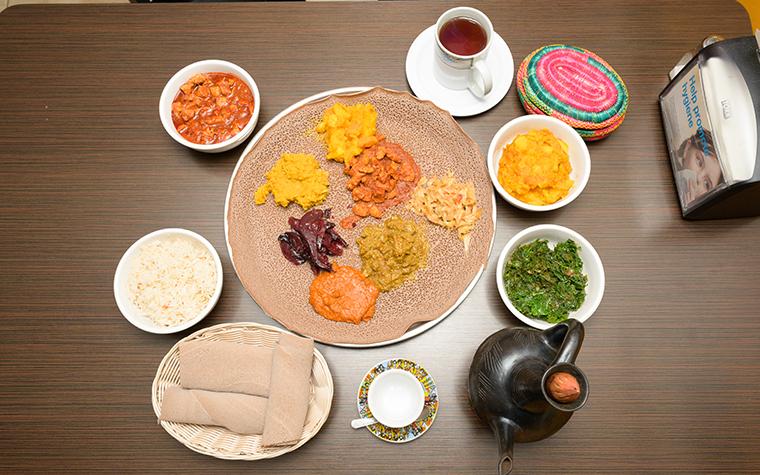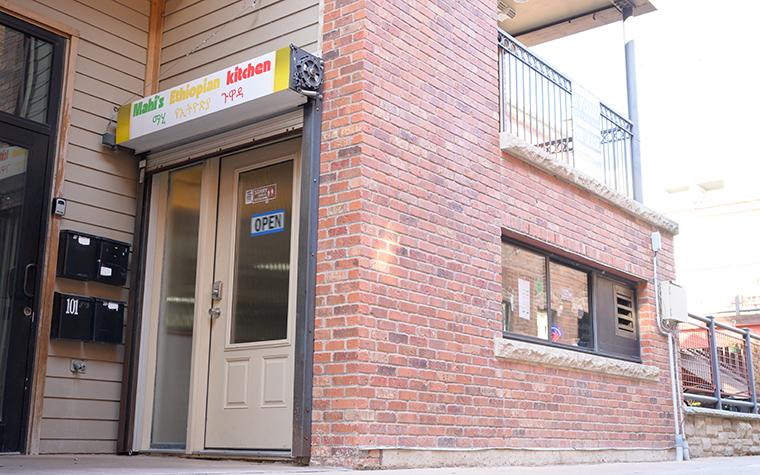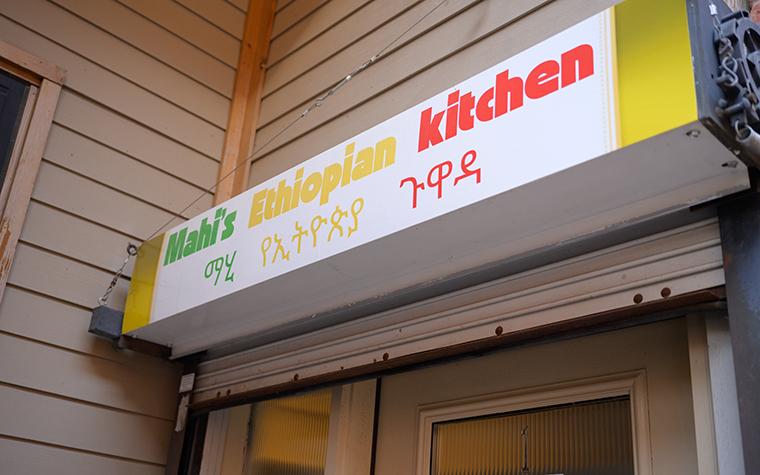With support from the Missouri Small Business Development Center, Mahalet Tesfaye opens the city’s first Ethiopian restaurant.
COLUMBIA, Mo. – Though Mahi’s Ethiopian Kitchen is tucked away on a pedestrian-only alley just south of Broadway in downtown Columbia, the restaurant isn’t hard to find. Even if you don’t notice the A-frame sign pointing the way on Ninth Street, you can’t miss the aroma of warm spices and slow-sautéed onions leading the way. Inside, colorful, richly spiced stews and tangy injera flatbread invite diners to share a meal in the traditional Ethiopian style.
Finding the right path to small business ownership is not so straightforward, however. There’s no single recipe for success.
“It can be overwhelming,” says owner Mahalet “Mahi” Tesfaye, who opened Columbia’s first Ethiopian restaurant last summer. She had a lot of experience cooking, learning traditional recipes at her mother’s side as a child. But starting a business was uncharted territory.
But Tesfaye had help through University of Missouri Extension’s Missouri Small Business Development Center (SBDC). With funding from the U.S. Small Business Administration and local partners, Missouri SBDC offers free and low-cost services for both new and established entrepreneurs. With advice and resources from SBDC, Tesfaye was able to realize a dream years in the making.
A dream with roots abroad
In the 1990s, Tesfaye’s family left Ethiopia for Kenya, where her mother opened a small restaurant. Later, after the family moved to San Jose, California, she gained more experience preparing meals in university and hospital cafeterias.
In 2018, Tesfaye and her mother moved to Columbia after her mother had attended a wedding there and was attracted by the lower cost of living and smaller scale.
As a college town, Columbia also had some big-city amenities, including a growing restaurant scene open to global flavors. Tesfaye saw an opportunity to share the cuisine she loved.
What she needed was guidance on how to turn that idea into a viable business.
Step by step with SBDC
Tesfaye connected with the Missouri SBDC, where business counselors walked her through the process, which includes evaluating the viability of an idea, creating a business plan and setting up an LLC. “They broke it into steps so it wasn’t overwhelming,” Tesfaye said.
Her counselors include Mark Christian, Marsha Moore and Paul Zacharias. They encouraged her to test her concept first at CoMo Cooks, a local food business incubator. At CoMo cooks, Tesfaye sold dishes a few days a week while still working full-time transporting patients at Women’s and Children’s Hospital.
Tesfaye learned how to refine her dishes—maintaining authentic flavors while moderating spice levels for Midwestern palates. She also built a following of repeat customers. With that foundation, she saved enough from her sales to open her own restaurant in 2024 without taking out a loan.
The five-table restaurant introduces diners to dishes like doro wat (a spicy chicken stew), tender beef tibs and vegetable platters rooted in Ethiopia’s Orthodox Christian fasting traditions. The menu also includes kitfo, minced raw beef marinated in spices and clarified butter. (By one account, the dish originated in the 1890s during the First Italo-Ethiopian War, when resistance fighters ate meat raw to avoid lighting cooking fires that could reveal their position to Italian troops.) Meals are served on injera, a slightly sour flatbread made from teff flour, with diners tearing off pieces to scoop up food by hand.
Courage, flexibility and support
SBDC counselors say Tesfaye’s willingness to learn and adapt was key.
“Some clients come in with rigid preconceptions,” said business counselor Marsha Moore. “You need to be open to modifying the idea.”
Missouri SBDC resources include research such as local demographics to help assess the soundness of a business idea.
“Just because you can cook doesn’t mean starting a restaurant is a good idea,” said Zacharias. “You need to bring something new and be willing to go through the steps. Mahi did both.”
Tesfaye continues to lean on SBDC for advice when new challenges arise, from payroll questions to marketing strategies.
Extension’s role in business success
SBDC counselors emphasize that Tesfaye’s story illustrates how a client’s passion and commitment and SBDC’s research-based tools and guidance can complement one another. “Our role is to provide the information and structure so clients can make confident decisions, ” Zacharias said.
Patience, Tesfaye says, is essential in Ethiopian cooking. Onions, the base of most stews, must be slowly sautéed until they nearly melt into a rich, sweet paste—a process that can take an hour or more. The batter for injera, the spongy flatbread that anchors every meal, must ferment for days before it is ready for the griddle.
Building a business, she says, requires a similar mindset. From testing her recipes at CoMo Cooks to saving enough to open her own restaurant, she learned that a careful, deliberate approach—just like in the kitchen—produces the best results.
Mahi’s Ethiopian Kitchen is open noon-7:30 p.m. Wednesday-Saturday at 905 Alley A, Ste. 101, in downtown Columbia.
About Missouri SBDC
The Missouri Small Business Development Centers (SBDC) are part of University of Missouri Extension and the U.S. Small Business Administration’s nationwide network of business assistance programs. Missouri SBDC provides business planning, financial analysis, management training and more to help entrepreneurs start, grow, and succeed. Most services are offered at no cost. For more information, visit sbdc.missouri.edu.
Photos
Mahalet Tesfaye. Mahalet Tesfaye took advantage of free counseling from the Missouri Small Business Development Center as she was launching her restaurant. Photo by Trevor Borgman, MU Extension.
Ethiopian food. Ethiopian meals are typically shared, with servings placed on a large piece of injera, a fermented flatbread. Pieces of injera are also used to scoop up mouthfuls of food. Photo by Trevor Borgman, MU Extension.
Mahi's Ethiopian Kitchen 1. Mahi’s Ethiopian Kitchen in Columbia, Mo. Photo by Trevor Borgman, MU Extension.
Mahi's Ethiopian Kitchen 2. The restaurant is tucked away on a pedestrian alley in downtown Columbia, but the aroma can draw curious passers-by from busy Ninth Street. Photo by Trevor Borgman, MU Extension.



